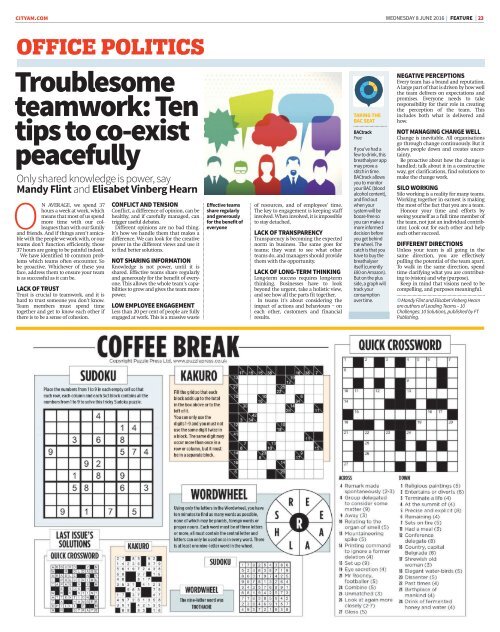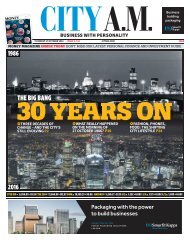SPORTS DIRECT AND TO THE POINT
cityam-2016-06-08-57575bc45f929
cityam-2016-06-08-57575bc45f929
Create successful ePaper yourself
Turn your PDF publications into a flip-book with our unique Google optimized e-Paper software.
CITYAM.COM<br />
WEDNESDAY 8 JUNE 2016<br />
FEATURE<br />
23<br />
OFFICE POLITICS<br />
Troublesome<br />
teamwork: Ten<br />
tips to co-exist<br />
peacefully<br />
Only shared knowledge is power, say<br />
Mandy Flint and Elisabet Vinberg Hearn<br />
ON AVERAGE, we spend 37<br />
hours a week at work, which<br />
means that most of us spend<br />
more time with our colleagues<br />
than with our family<br />
and friends. And if things aren’t amicable<br />
with the people we work with, or our<br />
teams don’t function efficiently, those<br />
37 hours are going to be painful indeed.<br />
We have identified 10 common problems<br />
which teams often encounter. So<br />
be proactive. Whichever of these you<br />
face, address them to ensure your team<br />
is as successful as it can be.<br />
LACK OF TRUST<br />
Trust is crucial to teamwork, and it is<br />
hard to trust someone you don’t know.<br />
Team members must spend time<br />
together and get to know each other if<br />
there is to be a sense of cohesion.<br />
CONFLICT <strong>AND</strong> TENSION<br />
Conflict, a difference of opinion, can be<br />
healthy, and if carefully managed, can<br />
trigger useful debates.<br />
Different opinions are no bad thing.<br />
It’s how we handle them that makes a<br />
difference. We can look for the creative<br />
power in the different views and use it<br />
to find better solutions.<br />
NOT SHARING INFORMATION<br />
Knowledge is not power, until it is<br />
shared. Effective teams share regularly<br />
and generously for the benefit of everyone.<br />
This allows the whole team’s capabilities<br />
to grow and gives the team more<br />
power.<br />
LOW EMPLOYEE ENGAGEMENT<br />
Less than 20 per cent of people are fully<br />
engaged at work. This is a massive waste<br />
Effective teams<br />
share regularly<br />
and generously<br />
for the benefit of<br />
everyone<br />
of resources, and of employees’ time.<br />
The key to engagement is keeping staff<br />
involved. When involved, it is impossible<br />
to stay detached.<br />
LACK OF TRANSPARENCY<br />
Transparency is becoming the expected<br />
norm in business. The same goes for<br />
teams; they want to see what other<br />
teams do, and managers should provide<br />
them with the opportunity.<br />
LACK OF LONG-TERM THINKING<br />
Long-term success requires long-term<br />
thinking. Businesses have to look<br />
beyond the urgent, take a holistic view,<br />
and see how all the parts fit together.<br />
In teams it’s about considering the<br />
impact of actions and behaviours – on<br />
each other, customers and financial<br />
results.<br />
TAKING <strong>THE</strong><br />
BAC SEAT<br />
BACtrack<br />
Free<br />
If you’ve had a<br />
few to drink, this<br />
breathalyser app<br />
may prove a<br />
stitch in time.<br />
BACtrack allows<br />
you to monitor<br />
your BAC (blood<br />
alcohol content),<br />
and find out<br />
when your<br />
system will be<br />
booze-free so<br />
you can make a<br />
more informed<br />
decision before<br />
you get behind<br />
the wheel. The<br />
catch is that you<br />
have to buy the<br />
breathalyser<br />
itself (currently<br />
£80 on Amazon).<br />
But on the plus<br />
side, a graph will<br />
track your<br />
consumption<br />
over time.<br />
NEGATIVE PERCEPTIONS<br />
Every team has a brand and reputation.<br />
A large part of that is driven by how well<br />
the team delivers on expectations and<br />
promises. Everyone needs to take<br />
responsibility for their role in creating<br />
the perception of the team. This<br />
includes both what is delivered and<br />
how.<br />
NOT MANAGING CHANGE WELL<br />
Change is inevitable. All organisations<br />
go through change continuously. But it<br />
slows people down and creates uncertainty.<br />
Be proactive about how the change is<br />
handled; talk about it in a constructive<br />
way, get clarifications, find solutions to<br />
make the change work.<br />
SILO WORKING<br />
Silo working is a reality for many teams.<br />
Working together in earnest is making<br />
the most of the fact that you are a team.<br />
Honour your time and efforts by<br />
seeing yourself as a full time member of<br />
the team, not just an individual contributor.<br />
Look out for each other and help<br />
each other succeed.<br />
DIFFERENT <strong>DIRECT</strong>IONS<br />
Unless your team is all going in the<br />
same direction, you are effectively<br />
pulling the potential of the team apart.<br />
To walk in the same direction, spend<br />
time clarifying what you are contributing<br />
to (vision) and why (purpose).<br />
Keep in mind that visions need to be<br />
compelling, and purposes meaningful.<br />
£Mandy Flint and Elisabet Vinberg Hearn<br />
are authors of Leading Teams – 10<br />
Challenges: 10 Solutions, published by FT<br />
Publishing.
















